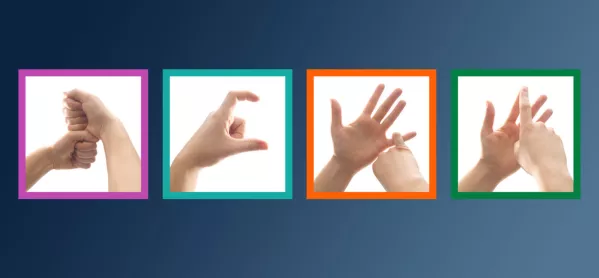British Sign Language GCSE set to launch in 2025

A British Sign Language (BSL) GCSE is set to be launched in 2025, the government has announced today.
The Department for Education has published the subject content for the BSL GCSE after the consultation was delayed twice.
Members of the deaf community were among those who contributed to a 12-week public consultation ensuring the subject content was fit for purpose.
However, unions have warned over the “feasibility” of the qualification due to short staffing and a lack of investment and training.
- Background: Delayed consultation on sign language GCES gets underway
- Learning deficit: Deaf GCSE students ‘more than a year behind’
- Teaching and learning: How BSL has transformed learning in my class
Geoff Barton, general secretary of the Association of School and Colleges, said: “It is important to recognise that there are likely to be practical constraints because schools are under tremendous pressure in terms of staffing, finances and time.”
Mr Barton welcomed the new GCSE, but added that there needs to be “greater government investment” in education, as “sufficient resourcing is inextricably linked to the curriculum opportunities that schools and colleges are able to offer”.
Darren Northcott, national official for education at the NASUWT teaching union, also welcomed the “overdue” GCSE but said that there were “unanswered questions” over the feasibility of running the qualification.
“There are unanswered questions over how all those pupils who might wish to access this qualification will be able to do so, given that schools will need to have a BSL-trained teacher”, he said.
“There is no mention of BSL training being made available by the DfE for teaching staff or any additional funding for schools to bring in BSL specialists to deliver the GCSE, ” added Mr Northcott.
Legal challenge over lack of BSL GCSE
The qualification has been in the pipeline for several years and was prompted in part by a campaign launched by the family of Daniel Jillings, a deaf teenager from Suffolk, whose first language is BSL.
His family threatened the government with a legal challenge, saying that the lack of a GCSE in BSL may be “discriminatory and unlawful”.
In 2018, after initially stating that no GCSE would be launched, the government U-turned and confirmed that they would consider proposals.
The purpose of the qualification, which will be internationally recognised, is for students to learn to communicate effectively with other signers in work, social and academic settings, and also to provide a history of BSL in the UK, the DfE said.
It added that it aims to have the exam board syllabuses approved from September 2025.
BSL breaks down barriers
Education secretary Gillian Keegan said BSL “can open so many doors for young people, giving pupils an understanding of how thousands of people communicate and ultimately even expanding job prospects”.
She added the new GCSE will “break down barriers and give young people valuable new skills”.
Campaigners have long been calling for a qualification in BSL, including the National Deaf Children’s Society. The group’s chief executive, Susan Daniels OBE, said she is “delighted” that the finalised course content has now been published.
“A GCSE in BSL is vital as it will break down barriers and celebrate the rich culture and history of BSL,” she added.
The announcement comes after deaf students were recorded as on average almost a year-and-a-half behind their classmates who do not have any special educational needs or disabilities.
“An incredible amount of work has been undertaken to get to this point,” continued Ms Daniels, “not least from young deaf campaigner Daniel Jillings who fought so hard for the right to study a GCSE in BSL”.
In line with all qualifications, the GCSE is open to all pupils and will be recognised and accepted in school and college performance tables.
You need a Tes subscription to read this article
Subscribe now to read this article and get other subscriber-only content:
- Unlimited access to all Tes magazine content
- Exclusive subscriber-only stories
- Award-winning email newsletters
Already a subscriber? Log in
You need a subscription to read this article
Subscribe now to read this article and get other subscriber-only content, including:
- Unlimited access to all Tes magazine content
- Exclusive subscriber-only stories
- Award-winning email newsletters
topics in this article



